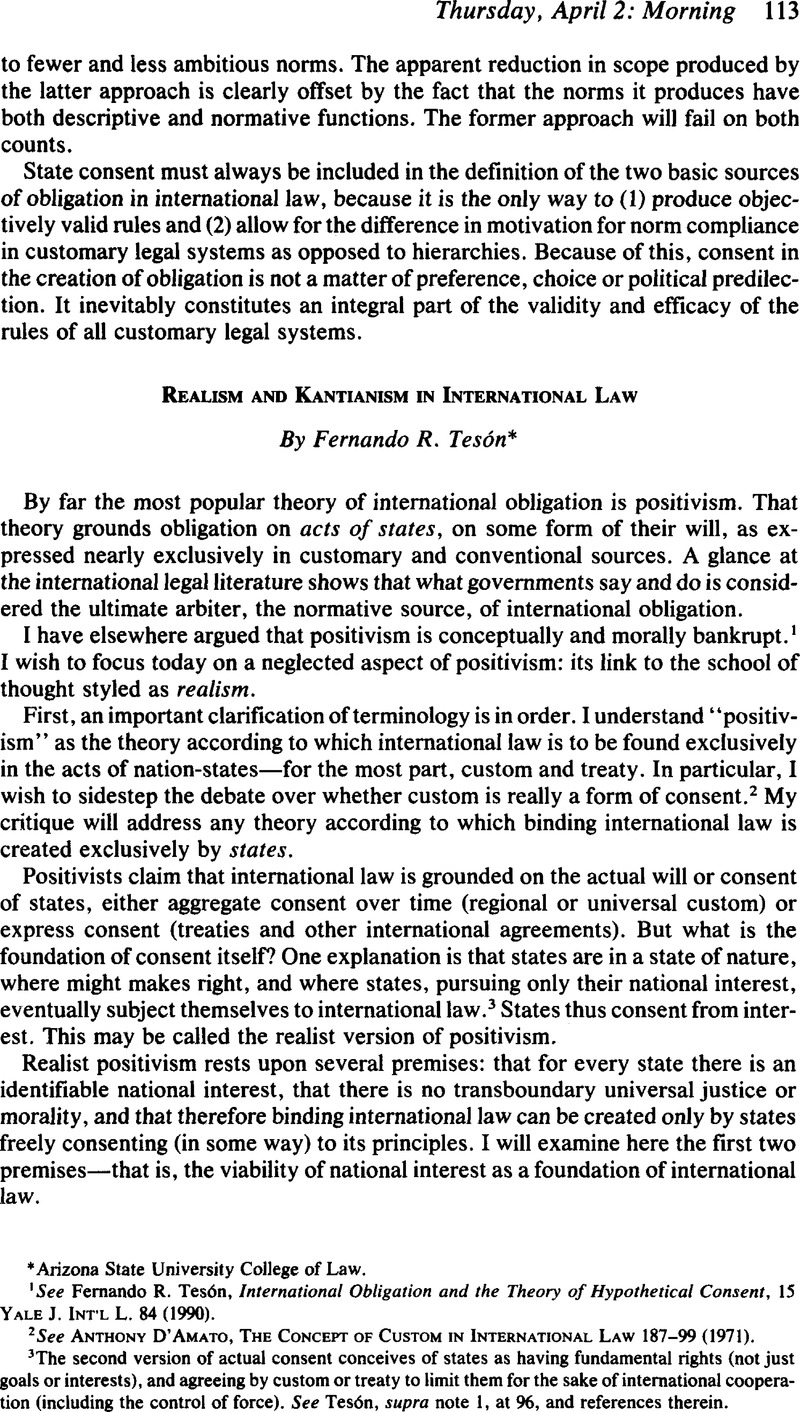No CrossRef data available.
Article contents
Realism and Kantianism in International Law
Published online by Cambridge University Press: 28 February 2017
Abstract

- Type
- The Jurisprudence of International Law: Classic and Modern Views
- Information
- Copyright
- Copyright © American Society of International Law 1988
References
1 See Fernando R. Tesón, International Obligation and the Theory of Hypothetical Consent, 15 YALE J. INT’L L. 84 (1990).
2 See Anthony D’Amato, The Concept of Custom in International Law 187-99 (1971).
3 The second version of actual consent conceives of states as having fundamental rights (not just goals or interests), and agreeing by custom or treaty to limit them for the sake of international cooperation (including the control of force). See Tesón, supra note 1, at 96, and references therein.
4 Seminal works in the realist tradition include Hans Morgenthau, Politics Among Nations (1959), Kenneth Waltz, Man, The State, And War (1959), and Hedley Bull, The Anarchical Society (1977). I realize, of course, that the doctrine of realism has many variations. Yet I deal in the text with the central and, as far as I know, uniform methodology of national interest analysis.
5 See Thomas Hobbes, On Dominion, chapter XIII, cited by F. H. Hinsley, Power and The Pursuit of Peace 51 (1963). See generally T. Airaksinen and Martin Bertman (EDS.), Hobbes: War Among Nations (1989). For a modern version of this view, see Terry Nardin, Law, Morality, and the Relations of States (1983).
6 For a convincing response to the realists’ moral skepticism, see MARSHALL COHEN, Moral Skepticism and International Relations, 13 PHIL. & PUB. AFF. 299 (1984).
7 Communitarians have so far confined themselves to domestic political philosophy. Representative communitarian views are Michael Sandel, Liberalism and the Limits of Justice (1982), and Michael Walzer, The Communitarian Critique of Liberalism, 18 POL. THEORY 6 (1990). To my knowledge, no one has applied communitarian philosophy to international law and relations. For liberal replies to communitarianism, see Amy Gutman, Communitarian Critics of Liberalism, 14 PHIL. & PUB. AFF. 308 (1985); and Carlos Nino, The Communitarian Challenge to Liberal Rights, 8 LAW & PHIL. 37 (1989).
8 The seminal work in this regard is John Rawls, A Theory of Justice (1971).
9 See Immanuel Kant, Perceptual Peace 114 (1792); see also F. R. TESóN, The Kantian Theory of International Law, 92 COLUM. L. REV. 53, 60-62 (1992).
10 See generally Plato, The Republic, Book VII. Elsewhere he writes: “The wise shall lead and rule, and the ignorant should follow,” PLATO, THE LAWS 690b. As Karl Popper has shown, the “Socrates” of The Republic is the embodiment of unmitigated authoritarianism. 1 Karl Popper, The Open Society and its Enemies 131 (2d ed. 1966).


